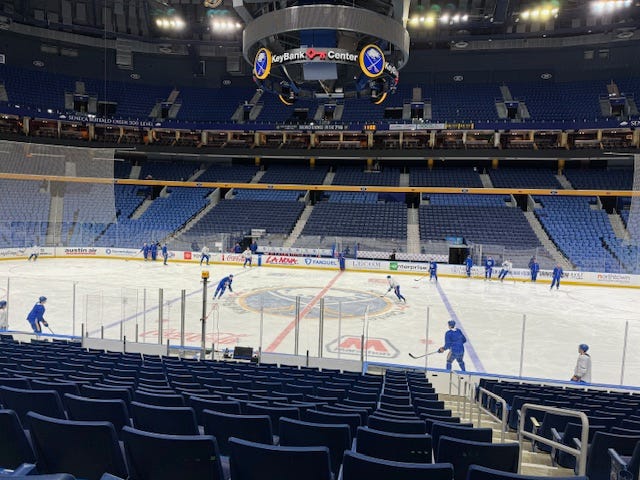Hockey in the absence of practice
The Sabres schedule for the past month-plus hasn't lent time for them to get in any real, actual practice time and that's something a struggling, youthful team needs most.
I can hear your wails already. The snark is evident. The bitterness is abundantly clear. This Buffalo Sabres team has disappointed you and it’s frustrated you to no end to watch a team that wound up as close to the postseason as any team has in over a decade turn out a season that, to this point, as seen them string together more than one win just once this season.
I can see your eyes rolling from here when I tell you this piece is going to be about practice time. I can already predict the sarcastic replies that will come of it. I know. I get it, I understand, and I know.
But when you watch the Sabres and see how they can beat the NHL’s best teams one night and then get blown out by, unfortunately, contemporaries like the Columbus Blue Jackets or Ottawa Senators another night the main questions boil down to:
“Why are they like this? How does this happen? What the hell is even going on there?”
For a team that’s lacked consistency in its game and with it their confidence has gone out the window, the inability to get in the good, quality practice time because of the NHL schedule is a contributing factor to that.
Think about the issues with the team that have persistently gone wrong so far this year, aside from injuries: power play, system cohesion, even competitiveness. All three of those issues specifically can be worked on or grow stronger thanks to more practice time.
“It allows guys to reset, and it allows you to work on some things that maybe you’re not able to if you’re playing back-to-backs or if you’re playing three or four games in six or seven days,” Alex Tuch said. “It’s allowing you to go back and go back to the basics and really just allow you to focus on the little things you need to focus on. Trying to get better each and every drill is really beneficial, especially after playing so many games in such a short amount of time. It can be really big with such a young group.”
I hear you quoting Allen Iverson but know that practice is beyond vital for a hockey team and when that time is missing or unavailable because of the game schedule itself, the results are obvious.
“When lots of things look not good it usually points to one thing: work harder— compete harder—and that resolves a lot of your issues,” Sabres coach Don Granato said. “Sometimes you sit and you say, ‘We need to work on A, B, C, D,’ and as soon as you get to anything more than that, you didn’t work hard enough, you didn’t compete hard enough because that fixes a lot of things. When you’re winning races, winning battles, willing to shoot because you’re willing to get rebounds your systems all of a sudden look great, as anybody’s does in this league.
“When they don’t look so great, that edge, that competitive edge is going to the other group and then you look bad in lots of different categories. The foundation of everything is work and compete and our style, our game is more pace and more skating. Obviously with younger legs and younger players you need that pace. It ties in with the work and compete.”
Keep reading with a 7-day free trial
Subscribe to Noted Hockey to keep reading this post and get 7 days of free access to the full post archives.


